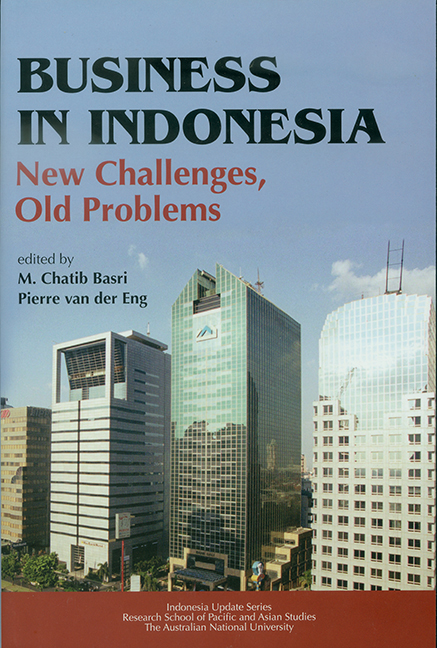Book contents
- Frontmatter
- Contents
- Tables
- Figures
- Contributors
- Acknowledgments
- Glossary
- 1 Business in Indonesia: Old Problems and New Challenges
- PART I Political and Economic Developments
- PART II Overview of the Business Environment
- PART III Foreign Investment and Trade
- PART IV Key Issues in the Business Environment
- 8 The Effects of Decentralisation on Business in Indonesia
- 9 Political Economy of Privatisation of State-owned Enterprises in Indonesia
- 10 Corporate Ownership and Management in Indonesia: Does It Change?
- 11 Tinkering Around the Edges: Inadequacy of Corporate Governance Reform in Post-Crisis Indonesia
- 12 Upholding Indonesian Bankruptcy Legislation
- 13 The Private Sector Response to Public Sector Corruption
- 14 A Challenge for Business? Developments in Indonesian Trade Unionism after Soeharto
- 15 Labour Regulation and the Business Environment: Time to Take Stock
- References
- Index
- Indonesia Update Series
10 - Corporate Ownership and Management in Indonesia: Does It Change?
from PART IV - Key Issues in the Business Environment
Published online by Cambridge University Press: 21 October 2015
- Frontmatter
- Contents
- Tables
- Figures
- Contributors
- Acknowledgments
- Glossary
- 1 Business in Indonesia: Old Problems and New Challenges
- PART I Political and Economic Developments
- PART II Overview of the Business Environment
- PART III Foreign Investment and Trade
- PART IV Key Issues in the Business Environment
- 8 The Effects of Decentralisation on Business in Indonesia
- 9 Political Economy of Privatisation of State-owned Enterprises in Indonesia
- 10 Corporate Ownership and Management in Indonesia: Does It Change?
- 11 Tinkering Around the Edges: Inadequacy of Corporate Governance Reform in Post-Crisis Indonesia
- 12 Upholding Indonesian Bankruptcy Legislation
- 13 The Private Sector Response to Public Sector Corruption
- 14 A Challenge for Business? Developments in Indonesian Trade Unionism after Soeharto
- 15 Labour Regulation and the Business Environment: Time to Take Stock
- References
- Index
- Indonesia Update Series
Summary
It has been argued that the Asian economic crisis of 1997–98 can be attributed to the vulnerability of the corporate sector in Asian countries, especially the poor system of corporate governance that shielded corporations from market discipline (World Bank 1998). A series of papers generated by a research project supported by the World Bank has revealed that East Asian corporations were characterised by high leverage, concentrated ownership, a high level of ultimate control by a few families and expropriation of minority shareholders, and argued that these characteristics contributed to weak corporate governance and poor corporate performance (Claessens, Djankov and Lang 1999, 2000; Claessens, Djankov, Fan and Lang 1999a, 1999b).
Empirical and theoretical study of corporate ownership and governance has evolved rapidly in recent years, coincidentally in the post-Asian crisis period after 1997.1 For example, La Porta, Lopez-de-Silanes and Shleifer (1999) provided evidence that concentrated ownership is common in modern corporations in developed countries around the world. Widely dispersed ownership, which some have taken as a modern standard in company organisation, is prevalent only in the United States and the United Kingdom. This suggests that concentrated corporate ownership does not necessarily imply weak corporate governance.
This chapter re-examines the thesis that concentrated ownership and family control over management characterises Indonesian corporations. It also discusses whether corporate ownership and management patterns have changed since the crisis and whether they have affected corporate performance. I begin by explaining the data and classifications used in the study. Next, I examine ownership and management patterns and analyse how they affected corporate performance before and after the crisis. Finally, I summarise the findings of the study.
DATA AND CLASSIFICATION OF OWNERSHIP
This study uses data for public companies listed on the Jakarta Stock Exchange (JSE) and data compiled and published by the Institute for Economics and Financial Research (ECFIN). The JSE company data are the only published data that contain both financial statements and lists of shareholders and board members. This permits analysis of ownership and management structures and how they relate to the financial performance of the companies concerned. The database I used comprises two time-series data sets: a database of all publicly listed companies, and a database containing the top 100 publicly listed firms.
- Type
- Chapter
- Information
- Business in IndonesiaNew Challenges, Old Problems, pp. 158 - 177Publisher: ISEAS–Yusof Ishak InstitutePrint publication year: 2004



